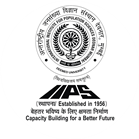- About IIPS
- Academics
- Study @ IIPS
- Departments
- Centres
- Controller of Examination
- Programme
- Distance and Online Education
- Training
- Facilities/Services
- Resources
- Virtual Learning
- Digital Initiatives (MHRD)
- Notice
- Seminars / Workshops / Conferences
- Conferences
- Publications
- Seminars
- Sponsored Research
- Workshops
- Collaboration
- National
- International
- NEP 2020
- Admission
- Courses
- Admission Bulletin
- TIME-TABLE For Admission 2025-26
- Model Question Papers
- Programme Coordinators
- Fellowships
- Academic Calendar
- International Students
- Visa Information
- Administration
- Faculty & Staff
- Research & Publications
- Library
- Information
- Right to Information
- Vigilance Officer
- Annual Report
- Director's Report
- Cells & Commitees
- Cells
- Commitees
- Committees of NEP 2020
- Staff Walfare Committee
- Cultural Committee
- Internal Committee
- Purchase Commitee
- Students Academic Committee
- Student Research Ethics Committee
- Anti-Ragging Committee
- Institutional Review Board
- Social Media Committee
- Prevention of Caste-based Discrimination Committee
- Code of Conduct and Professional Ethics
- National and International honours, Awards, Recognition, and Medals
- Online Facilities
- Employee's Corner
- Memorial Lectures
- Convocation
- IIPS Newsletters
- COVID 19 Information
- Life @ IIPS
Psychological Well-Being in Older Persons in India: The Role of Family
- Home
- Psychological Well-Being in Older Persons in India: The Role of Family
Abstract Content (not more than 300 word, should include: Introduction, Objective, Methodology, critical findings & Conclusion):
Introduction:
India is undergoing a rapid demographic transition, with its elderly population (aged 60 years and above) projected to reach nearly 20% by 2050. This ageing process, combined with migration of adult children and the decline of joint families, has weakened traditional caregiving systems. As a result, older persons increasingly face emotional and psychological challenges that demand policy and research attention.
Objective:
The paper examines how family structure, marital status, and children’s socio-economic characteristics influence the psychological well-being—specifically depression and life satisfaction—of older persons in India.
Methodology:
Using data from the Longitudinal Ageing Study in India (LASI), Wave 1 (2017–18), the study focuses on adults aged 60 years and above. Depression was measured using ten self-reported symptoms, and life satisfaction was assessed through five Likert-scale statements. Logistic regression analysis was applied to estimate the adjusted effects of family and household characteristics on mental well-being, controlling for socio-demographic and economic factors.
Critical Findings:
Results reveal that 28% of elderly persons experience depression, while over 55% report low life satisfaction. Living alone, being widowed, or residing in smaller households significantly increases vulnerability to poor mental health. In contrast, co-residence with spouse and children and larger family size are protective. The presence of at least one literate or employed child enhances life satisfaction and reduces depression risk. Interestingly, having both sons and daughters does not guarantee better well-being, highlighting that the quality of family relationships matters more than composition.
Conclusion:
Family remains the primary source of emotional and social support for India’s ageing population. Policies should strengthen family-centered care, community-based support, and mental health services.
Abstract theme:
In case of not been selected for oral presentation, do you want to be considered for the poster presentation ?:
Yes
Do you require financial support to attend the seminar ? (Not applicable for virtual meet):
Yes-full
Gender:
Female
Evaluation Status:
No
